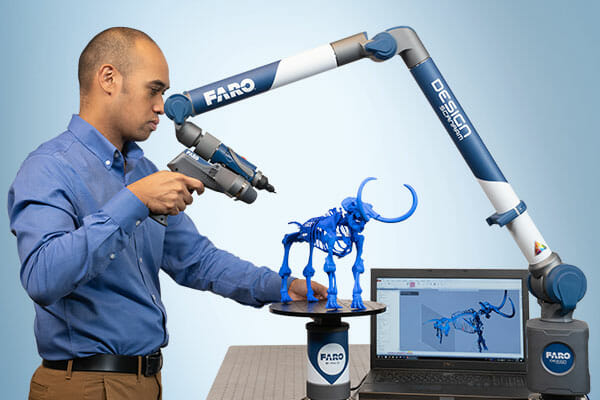3D Scan in Full Color

The PRIZM, a full-color laser line probe, can scan at speeds of up to 600,000 points per second. Image courtesy of Faro Technologies Inc.
Latest News
September 19, 2018
FARO Technologies’ new FARO Design ScanArm 2.5C 8-axis articulated arm-based solution comes out of the box with high-resolution, 3D color scanning capabilities. This portable, turnkey 3D scan-to-CAD solution, is the first portable measurement arm in the market to have full-color 3D scanning, the company says.
The FARO 8-Axis Design ScanArm 2.5C can provide full color for 3D modeling, reverse engineering and CAD-based design applications across the product lifecycle management (PLM) process, according to the company. Among the benefits this solution can provide, the company notes, is the ability for users to use the color 3D representation as a baseline for product visualizations and visual effects. It also enables users to reconstruct parts and objects and visualize them as vividly as they appear in the real world, Faro adds.
 A portable, turnkey 3D scan-to-CAD solution, the new FARO Design ScanArm 2.5C 8-axis articulated arm-based system comes out-of-the-box with high-resolution, 3D color scanning capabilities. Image courtesy of Faro Technologies Inc.
A portable, turnkey 3D scan-to-CAD solution, the new FARO Design ScanArm 2.5C 8-axis articulated arm-based system comes out-of-the-box with high-resolution, 3D color scanning capabilities. Image courtesy of Faro Technologies Inc.The Design ScanArm 2.5C is compatible with the recently announced FARO 8-Axis FaroArm system. This new FaroArm articulated arm, the company says, has been specifically designed to address design challenges across a range of industries including computer graphics, industrial machinery, auto manufacturing and engineering services.
The turnkey Design ScanArm 2.5C system integrates the 8-axis FaroArm with the FARO PRIZM full-color laser line probe, also recently announced, and with 3D design and modeling software. In addition to its color scanning capabilities, the PRIZM laser line probe provides scanning speeds of up to 600,000 points per second and volumetric accuracy up to 75 microns. The combination of these capabilities and the eighth-axis arm, explains Faro, allows for point capture with only small user movements. This, in turn, reduces repositioning needs and cuts back on time it takes to scan an object.
The Design ScanArm 2.5C, like its predecessor the Design ScanArm 2.0, is available in three maneuverable arm lengths: 2.5m, 3.5m and 4m. This system can be bundled with one of 3D Systems’ Geomagic software line of scanning, reverse engineering and inspection solutions. Optional dual hot-swappable batteries are available.
“FARO continues to be laser-focused on optimizing the productivity of design professionals,” stated Thorsten Brecht, senior director product design in a press statement. “By integrating exceptional quality color into the design process, we have created a best-in-class 3D reality experience by allowing users to capture more information, in true-to-life detail richness and color, in less time than ever before. The DesignArm 2.5C is yet another example of FARO pushing the boundaries of innovation and accepting the challenge to lead the market.”
For more information on the FARO 8-Axis Design ScanArm 2.5C, click here.
Watch an overview of the FARO 8-Axis Design ScanArm 2.5C.
Request a personalized, virtual demo of the FARO 8-Axis Design ScanArm 2.5C.
See why DE's Editors selected the FARO 8-Axis Design ScanArm 2.5C as their Pick of the Week.
Sources: Press materials received from the company and additional information gleaned from the company's website.
More FARO Technologies Coverage
Subscribe to our FREE magazine, FREE email newsletters or both!
Latest News
About the Author
Anthony J. Lockwood is Digital Engineering’s founding editor. He is now retired. Contact him via [email protected].
Follow DE




